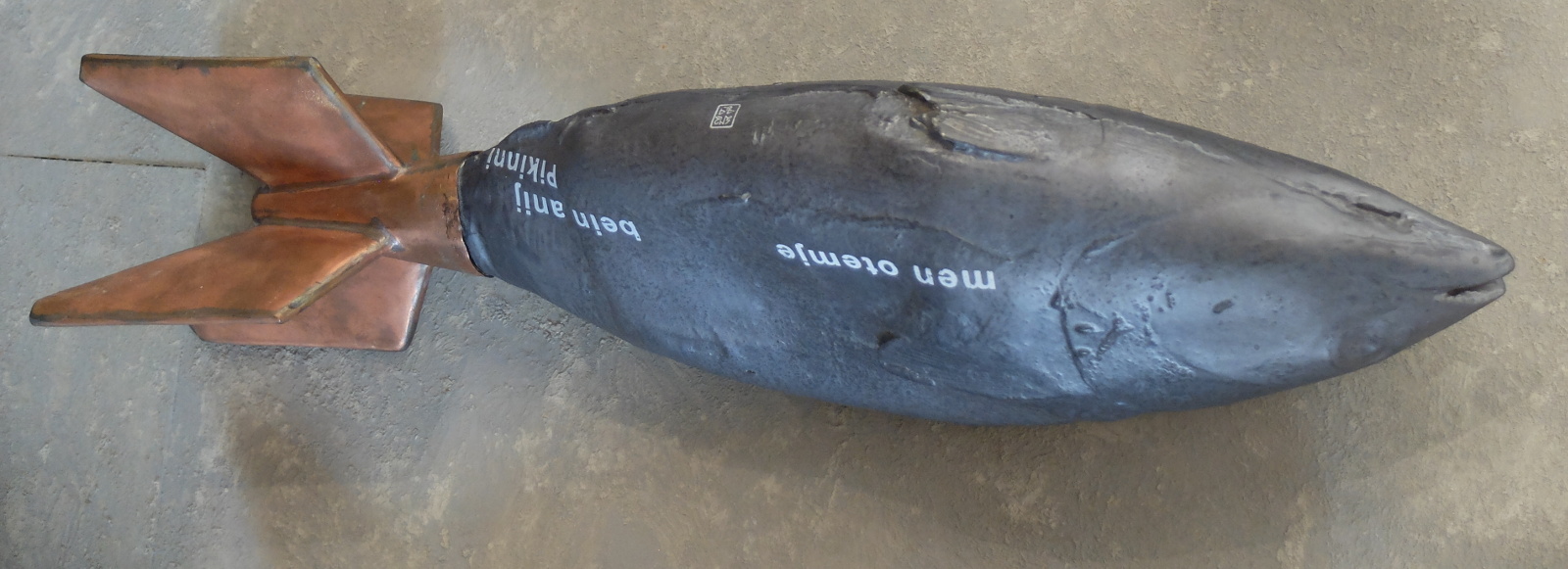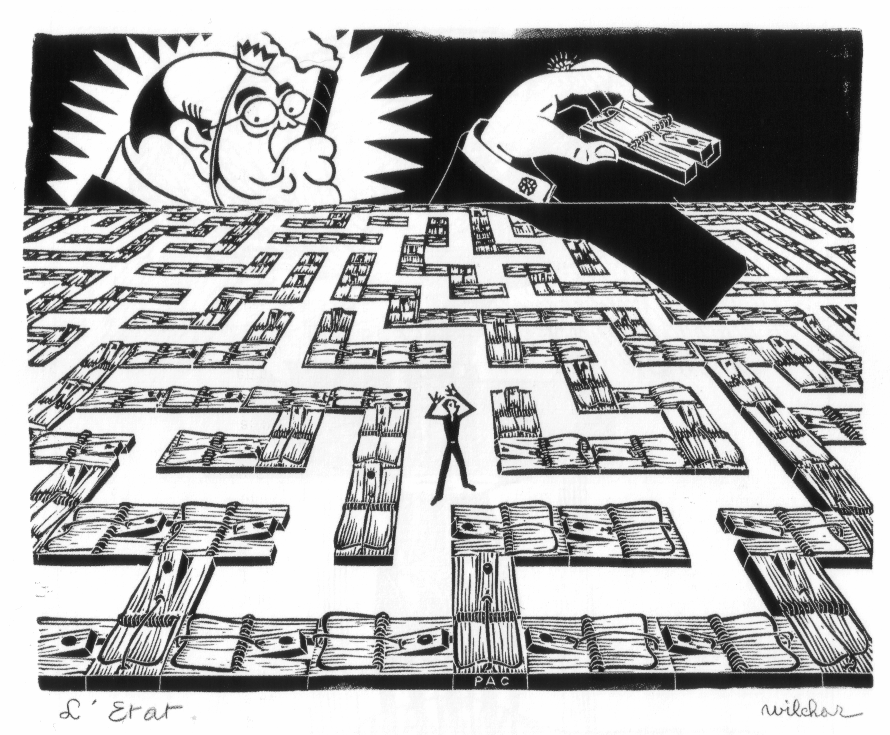(version 12/2007)
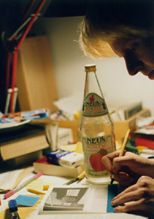
Learning
How to find a nice balance between learning and doing? I always wanted to do both. For some years I forced my parents to open their books far more often than they were used to. My sister suffered a severe shock the day she discovered, that I do not know all that what I pretended to know (Nele, the time was great anyway, isn’t it? :-) I was happy, however, to be allowed to go to the kindergarden (hi Gorm, where are you? – I found the idea, to throw burning pieces of paper out of the window, which had swasticas on them rather strange, but I will never forget, that there was “a Danish king, called Gorm…”), and then to school (by the way, Alexander, what are you doing today? – I will never understand, what made us buying Playmobil soldiers in dozens…).
School offers quite a few opportunities to learn. Anyway, 13 years of schooling are rather too much. I do not at all understand anymore, why leftist youngsters – like me at the time – are against shortening the years of schooling in Germany? What is bad with the idea, to change to university with its far greater choice and freedom at the age of 18/19 instead of 19/20? Irish and Belgian university students, however, register at university already as minors, what gives the parents too much influence, that can not be the aim neither. But why not at the age of 18?
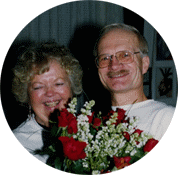
(my parents)
Anyway, school is not life. You can also go to the local library and fetch a basket of books every week (I remember especially the very animating counsils of a young librarian, whose name I do not know anymore). Never to forget the two ladies who helped my parents three times a year to buy a pile of childrens’ books at their bookshop “KiBuLa“…
By the way: Never throw a stamp away! Stamps can make Malte happy, so why to grant them to the garbage? I assure you, that you will never have to regard my stamp collection, when you come along (a German running gag), you only have to have a glimpse on my pictures…
Doing
There came a moment when I did not want to go on with purely consuming ideas, but wanted to share them with others (and not only putting all the burden of listening onto Nele perhaps…). Two opportunities opened the way: Lars (thanks for the years of great co-operation!) and mine school newspaper “Kurzschluss”, followed by the local Young Socialists, run basically by Christian (I am still convinced, that it makes more sense to laugh about politicians than to get depressive, how about you today? :-) ) and me.
“Kurzschluss” and Young Socialists were also great opportunities to learn, how to work fruitfully together with other people having different motivations and ideas, but always reaching consensus and results at the end (Hey Mirko, that’s it, what leads to satisfaction – using other human beings only as tools for your own personal purpose will never satisfy yourself!).
The courses of mathematics for school pupils held at Hamburg university where of a different kind. In the beginning the interest in mathematics and the solving of logical problems was predominant. With time, the chat of breaks and evenings became so important, that there was really no sense to stay anymore, not to disturb the people seriously working over there. Hi, Thomas you also started to work more, when I left, wasn’t it? Still regrettable, however, Basti, your removal to Bielefeld – I always had the impression, to get my brain doubling its rotation, while talking with you.
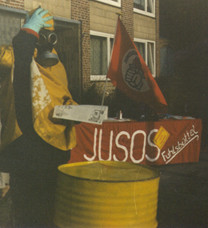
(how to inform people about the dangers of the chemical industry,
if a gas mask hinders you to speak?)
Doing politics can be very stimulating, especially if you understand it as enhancing dialogue among people. Campaigns on the streets tell you, that the people out there are much better informed and have a much better political judgement than all party officials together can imagine – referendums are a must! We experienced at the same time, that it is not difficult at all to motivate people for social and political goals, if you only allow them to estimate effectivity and time consumation from the outset.
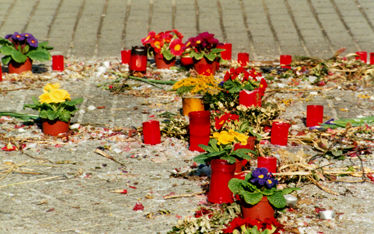
(the best political action is one which enforces debate on the street
– here mannheim during the gulf war)
German political careers begin usually in back rooms of bars or Greek restaurants. And it is really easy to get further up. You only have to be present in as many committees as possible, without opening your mouth too much and you will move up smoothly. Politics of this kind, is, however, more a state of mind than a profession: You need to sacrify your whole time and interest to party meetings. How could this attract anybody, being interested in other things at the same time (intellectually for example). It’s an automatism, that you will rarely anymore get somebody interested, say in literature or art, into professional politics. Gerlind, did you discover life outside politics in the meantime?
The poor people who invest themselves fully there, do soon not have any perpective outside “the machine” anymore. The main reason, why we can never get rid of bad politicians: they do not know, what to do else…
The best experience was the Peace Movement. There we were really able to get beyond politics as a game of friend and ennemy (Carl Schmitt) and to work together, bridging huge differences (between communists and lutherans for example). Without your great work of holding this club together, Dirk, I would perhaps share most peoples’ view, that this is impossible.
Goodbye Hamburg
The obligatory social service gave insight in social conditions not known before, gave the affirmation, that I am not too lazy to stand full time work getting up in the morning at 6 am, the joy of equal working relations with mentally handicapped without a glimpse of false pity and the discovery that mental handicap is much more a social than a medical indication. Even if it was not too nice, to become “ill” for 6 months, just the very moment, I had started working on my own, Horst – thank you and the others anyway :-)

(hamburg harbour)
I always regarded Hamburg as the most beautiful city I know: very green, very much water, an open spirit, a cultural and economic metropolis which does not need to demonstrate its greatness every day – just “Heimat”. Today, I also see the far to large space given to cars in the city, the lack of cosy corners, the awful dominance of concrete buildings in big parts of the city centre, but it rests an advisable place in any case :-). Funny, that I got to know my best friend from school, only the summer after finishing school: Ralph, I am really happy about our trip to Hungary and beyond – we would probably never have stayed in contact as long. And thanks a million for all the help I got from you!
Mannheim
Now goodbye Hamburg! Leaving the parents’ home, exploring another corner of Germany with its different mentalities, attending a less overcrowded university, getting rid of the long distances by moving to a smaller city… Mannheim on the banks of Rhine and Neckar with its unbeatable good wheather…
Soon I learned that Mannheim is not small, it is at least medium sized :-). It is situated in a small country called “Kurpfalz”, surrounded by hostile neighbours who are so extremely different (Suabians, Badenians, Palatinatians, Hessenians and all their subgroups)… Mannheim is rather not so known in Germany but maintains one of its best theaters, a beautiful university, a compact city center and is for Palatinate and Baden-Württemberg something like the door to the outside world. Brief: nice place to live for some years (… and how I miss its sun!).
However, how comes that some cities have a stronger spirit of intellectual thought, a stronger sense of modernity, a livelier public debate and others less? What is provinciality and where does it comes from…?
Changing to Mannheim for studies was an expression of the strong desire to restart intellectual learning. Political activities were reduced to project oriented and time limited work. I started searching for a good balance of work, engagement, “Muße”, learning, reflection and exploration.
Studies were as much a time of social contact. Three-hour lunchbreaks (Christian, are you still explaining Marx to business simpletons?), midnight-gaming brunches (Martin, why not having some spaghetti?), talk and exchange of ideas (Nic and Monika, your parts do not fit into brackets, but you are aware of it anyway, isn’t it?). A new experience: for the first time lots of friends! One day on a visit in Hamburg I realised that entering a pub I was automaticlly looking around, if I wouldn’t know someone – just a Mannheim habit… (Toepfl, how is it going?)
Nevertheless, it turned out that university is not more detached from society than school is, and that it can be quite boring to study if there are too many people around who are only interested in passing the exams rather than exploring the subject.
Nonetheless: university lectures are an offer one can make use of or not, but how to do it, if they are always just in the very moment there are other interesting things coming up? :-) – again, libraries reveal themselves as main source of intellectual inspiration, accompanied now increasingly by second hand book shops and the like…

(one comes after the other…)
While the questions raised by political science do interest me more, it seems to me that I can work much longer on history subjects. However, probably both are more interconnected than one might think. My main interest are societies and cultures in comparison. why countries develop differently? and how to learn from the other’s experiences?
As the studies proceeded, one question became bigger and bigger: The huge number of single elements, which make up our picture of the world, where do they come from, who thought them first, how comes, that they seem to build a coherent network while deriving from more than 2000 years of (political) thought? (see now my Lesebuch for watching me tracking my ideas)
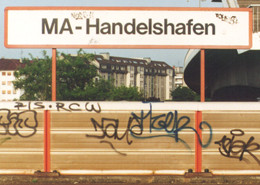
(address in Mannheim: Akademiestraße)
This stay in southern Germany and even more the year in Ireland taught me about the immense cultural differences between societies which – seen superficially – don’t seem to be too different. The main difficulty is for me to understand when an expressed yes is meant to be a no. Sorry to a friendly guy from the Irish Labour party, which I annoyed a whole evening by ignoring his desperate hints for me to leave.
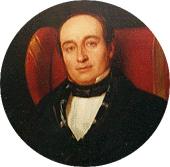
(Carl Hinrich Ludwig Brinckmann (1809-1855))
Studies finished with more than 18 months work on a Heidelberg law lecturer from the mid 19th century. After that I did not want to stay in university, only because I did not know anything else. So, something outside university, a new place, a new country, a (later two) new languages, an inside view of europe, why not a bit more politics again?
How to make a living??
How to get beyond jobs? How to make a profession out of your knowledge, capacities, wishes, dreams? Would anybody be interested in what I could provide? How to pay a living out of all this?
University did not teach me anything about all these things. A bit surprised I realised that ending up with an university diploma does not mean you would have the slightest clue about what to do with it.
What kind of professions I might have imagined when I started university studies? Politics? Journalism? Research? I needed some time to realise, however, that I was not made for either of these professions:
For politics as a profession you need to love power. Observing power games can be funny and instructive from time to time, but having power did never interest me. You have to find people exciting who follow you everywhere and who repeat all the time what you were saying. You have to choose the people to whom to talk, the events you attend in function of what can be useful for your carreer. I cannot imagine something more boring :-)
Journalism is not a profession, it is a way of life. You have to constantly screen everything what you hear, see or smell for “does it make a story?” You have to carry on sorting out your thoughts as well as writing them down, when your curiosity is already fed. I mostly prefer turning to the next subject when I feel to have learned enough about the previous one, you might call it laziness. But more important: I do not love at all to explore subjects others, or “the market” are interested in instead of following my own interests :-)
And Research? Surely the most tempting. But I completely missed the access to it. I always oriented my studies by interest, not by carreer chances. Then, everybody searches for “specialists”, I am a “generalist”, my studies missed “profile”. It is quite hurting when I remarked for the first time that knowing more about a self-declared specialist’s special subject does not mean at all to bypass him – broad interests and knowledges even refrain your job opportunites!! :-o And more, you have to be mobile – you have to stay or to go where somebody offers you a position. But I am not mobile. I want to choose myself where to live. I want to experience a place, a city, a country of my choice. I always wondered how commuters could split themselves between two places (Sonja, are you still up and running?). Sorry to the two professors who proposed to me to “talk about future plans” and whose invitations I did not follow, fearing that they could propose me something which could bind me to Mannheim some more years. Anyway, for somebody interested in Western European politics I lacked language knowledge. And what you missed during your studies, you have to do afterwards…
Brussels
Removal to Brussels, secretary of the Federation of the Young European Greens, other jobs aside, European Commission, ngo’s, a bit of journalism, translations, learned French and Dutch… Thanks to Karlheinz, Ilka, Hans and Magali for making a professional start possible. Friends are coming and going far too fast in this city of constant fluctuation, special greetings to Christian, Petra and Wolfgang!
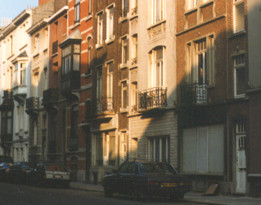
(first address in brussels: rue j. coosemans)
What about Brussels? The main impression is that European integration means in the first place a boring begging competition for mini-subventions, and that Belgium is far more interesting than “Europe”…
Nevertheless, the most interesting point in Europe (and in the work of the FYEG for example) is to watch how people from different political cultures learn about their differences and how to come together. The one main rule is, that fundamental differences always appear in the very moment you would never have imagined them to appear. Thanks to all those great people from the FYEG for your more than two-years of companionship – with special regards to Stefan (and my deep apologies for all the stupid stuff I might have said about the Balkans)!
One of my numerous little jobs was doing “alternative” city tours. That meant deeper studies of Brussels and Belgium – a very interesting field, which will continue to interest me for a long time.
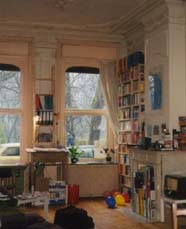
(second address: Av. des Azalées)
Watching back some ten years later, I amaze myself by ending up learning and teaching as a profession! Back to the roots. Learning and teaching on the subjects which interest me, and in the meantime nearly completely self-organised and self-employed: I got more and more demand for my Brussels city tours by the years, which enabled me to slowly give up one other job after the other. By the time I added lectures and weekend-seminaries on Belgium.
Book now!
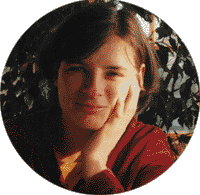
(woman of my life)
Anyway, I could not imagine to leave private activities aside only for a job. Unbeleavable, but true: I have found the woman of my life here and we even got three cute little daughters. They occupy far too much time and energy to enably you to work full time (even the very good childcare facilities, monday to friday, eight to six, from the age of 6 months, taken into account) – Being self-employed, being (relatively) master of my time, turned out to be perfect for me, even if in the beginning it was only because nobody wanted to give me a job :-)
See you once!
Yours, Malte.
